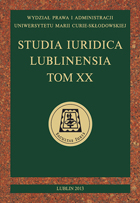Sejmowa kontrola działalności służb specjalnych i jej ograniczenia wynikające z ustaw kompetencyjnych. Zarys problemu na tle uwarunkowań normatywnych
Sejm control of secret service and its limitations resulting from laws related to jurisdiction. An outline of the problem against normative conditioning
Author(s): Martin BożekSubject(s): Constitutional Law, Public Administration, Government/Political systems, Security and defense, Politics and law
Published by: Wydawnictwo Naukowe Uniwersytetu Marii Curie-Sklodowskiej
Summary/Abstract: The activity of secret service, because of its importance for the basic public interests and a high level of secrecy in operational actions, must be under constant surveillance of political authorities. Therefore, a parliamentary control of secret service is a profound element of systemic solutions. It is one of the standards of modern democratic states, especially the states based on a parliamentary system of ruling. The parliamentary control of secret service is an example of exercising control over the Council of Ministers and governmental institutions. Each act on a particular secret service states that the activity of their chiefs is under control of the Sejm. But none of these acts says what kind of control it is supposed to be. They do not define the scope of powers to control entitled to the Commission on Secret Service, either. As a result of such a legal loophole its effectiveness is questionable. Especially, imprecise legal regulations on access to secret information raise concern. This article presents a proposal for legal solutions, which may, in the author’s opinion, bring positive changes in actual state of affairs.
Journal: Studia Iuridica Lublinensia
- Issue Year: 20/2013
- Issue No: 2
- Page Range: 47-69
- Page Count: 23
- Language: Polish

